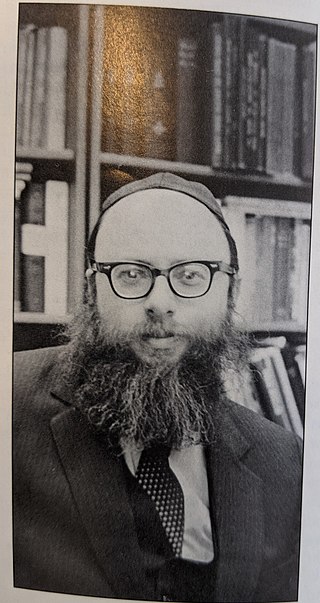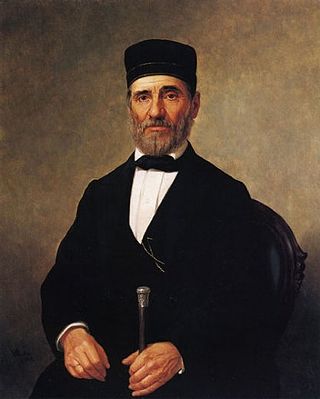A rabbi is a spiritual leader or religious teacher in Judaism. One becomes a rabbi by being ordained by another rabbi—known as semikha—following a course of study of Jewish history and texts such as the Talmud. The basic form of the rabbi developed in the Pharisaic and Talmudic eras, when learned teachers assembled to codify Judaism's written and oral laws. The title "rabbi" was first used in the first century CE. In more recent centuries, the duties of a rabbi became increasingly influenced by the duties of the Protestant Christian minister, hence the title "pulpit rabbis", and in 19th-century Germany and the United States rabbinic activities including sermons, pastoral counseling, and representing the community to the outside, all increased in importance.

Aryeh Moshe Eliyahu Kaplan was an American Orthodox rabbi, author, and translator best known for his Living Torah edition of the Torah and extensive Kabbalistic commentaries. He became well-known as a prolific writer and was lauded as an original thinker. His wide-ranging literary output, inclusive of introductory pamphlets on Jewish beliefs, and philosophy written at the request of NCSY are often regarded as significant factors in the growth of the baal teshuva movement.
Semikhah is the traditional Jewish name for rabbinic ordination.

Shlomo Riskin is an Orthodox rabbi, and the founding rabbi of Lincoln Square Synagogue on the Upper West Side of New York City, which he led for 20 years; founding chief rabbi of the Israeli settlement of Efrat in the Israeli-occupied West Bank; former dean of Manhattan Day School in New York City; and founder and Chancellor of the Ohr Torah Stone Institutions, a network of high schools, colleges, and graduate Programs in the United States and Israel.

Mordechai Gifter was an American Haredi rabbi. He was the rosh yeshiva (dean) of the Telz Yeshiva in Cleveland.
Jewish feminism is a movement that seeks to make the religious, legal, and social status of Jewish women equal to that of Jewish men in Judaism. Feminist movements, with varying approaches and successes, have opened up within all major branches of the Jewish religion.

Congregation Baith Israel Anshei Emes, more commonly known as the Kane Street Synagogue, is an egalitarian Conservative synagogue located at 236 Kane Street in Cobble Hill, Brooklyn, New York City, New York, in the United States. It is currently the oldest continuously operating synagogue in Brooklyn.
Abraham Aharon Price was a renowned Torah scholar, writer, educator, and a community leader in Toronto, Ontario, Canada. He was one of the city's most influential rabbinic figures.

Rabbi Dr. Bernard Illowy was a rabbi and leader of Orthodox Judaism in the United States.

Congregation Beth Israel is a Jewish congregation located at 10460 North 56th Street in Scottsdale, Arizona. Formally incorporated in 1920, it affiliated with the Reform Judaism in 1935.
Asher Lopatin is the executive director of the Jewish Community Relations Council/AJC, a nonprofit Jewish community organization in Bloomfield Hills, Michigan. He is an American Modern Orthodox rabbi and leader of Kehillat Etz Chayim, a Modern Orthodox synagogue in Huntington Woods, MI. He is also the founder and executive director of the Detroit National Center for Civil Discourse, which has run a Fellowship in Civil Discourse at Wayne State University since September 2019. Previously, he was the President of Yeshivat Chovevei Torah (2013-2018) and the spiritual leader of Anshe Sholom B'nai Israel Congregation in Chicago before that. He is a Rhodes Scholar and a member of the Council on Foreign Relations.

Women rabbis are individual Jewish women who have studied Jewish Law and received rabbinical ordination. Women rabbis are prominent in Progressive Jewish denominations, however, the subject of women rabbis in Orthodox Judaism is more complex. Although a significant number of Orthodox women have been ordained as rabbis, many major Orthodox Jewish communities and institutions do not accept the change. In an alternative approach, other Orthodox Jewish institutions train women as Torah scholars for various Jewish religious leadership roles. These roles typically involve training women as religious authorities in Jewish Law but without formal rabbinic ordination, instead, alternate titles are used. Yet, despite this alteration in title, these women are often perceived as equivalent to ordained rabbis. Since the 1970s, over 1,200 Jewish women have been ordained as rabbis.
Wolfe Kelman was an Austrian-born American rabbi and leader in the Conservative Judaism in the United States who never led a congregation, serving for decades as a mentor to hundreds of rabbis in his role as the executive vice president of the Rabbinical Assembly, where he also prepared the initial steps for the rabbinic ordination of women in the Conservative movement.
Temple Israel is the oldest synagogue in Columbus, Ohio, and a founding member of the Union for Reform Judaism. Formed as early as 1846 as the Orthodox Bene Jeshurun congregation, its first religious leader was Simon Lazarus, a clothing merchant who founded what would become Lazarus department stores.

Temple Israel is a Reform congregation located at 130 Riverside Drive in Dayton, Ohio. Formed in 1850, it incorporated as "Kehillah Kodesh B'nai Yeshurun" in 1854. After meeting in rented quarters, the congregation purchased its first synagogue building, a former Baptist church at 4th and Jefferson, in 1863. Strongly influenced by Rabbi Isaac Mayer Wise, it rapidly modernized its services, and, in 1873, was a founding member of the Union for Reform Judaism.
Baruch Alter HaCohen Taub is the founding rabbi and Rabbi Emeritus of the Beth Avraham Yoseph of Toronto Congregation (BAYT), the largest Orthodox congregation in Canada. He also served as the de facto chief rabbi of Vaughan, Ontario, and is the former National Director of NCSY. He currently lives in Netanya, Israel.
Congregation Kol Ami is a synagogue located in Salt Lake City, Utah, in the United States. The synagogue serves both Reform and Conservative congregations that are respectively affiliated with the Union for Reform Judaism and the United Synagogue of Conservative Judaism.
Solomon Goldman was an American Conservative rabbi. A noted orator, community leader and scholar, he was especially known for helping to popularize the cause of Zionism in the United States.
Hayim Halevy Donin (1928–1983), was an American Orthodox rabbi and the author of several books. Donin was born Herman Dolnansky in the city of New York and changed his legal name in 1955.
Philip Klein was a Hungarian-born rabbi who ministered in the Russian Empire and America.







